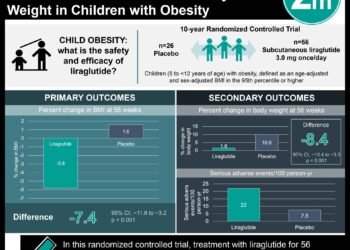Significant unreimbursed costs linked to care coordination for medically complex children
The estimated nonreimbursed staff costs of care coordination for medically complex children was conservatively estimated to be 145-210% per child per month.
Evidence Rating: Level 4 (Below Average)
Study Rundown: Children with medical complexity (CMC) may have congenital or acquired multisystem disease, severe neurocognitive impairments, dependence on medical technology, and/or require assistance with activities of daily living. While CMCs comprise <1% of the pediatric patients, they generate over a third of health care costs for this population. Current strategies to optimize CMC health while minimizing costs include care coordination by multidisciplinary teams. There is limited data on the financial value of such care coordination. In this cross-sectional study, researchers at the University Hospitals Rainbow Center for Comprehensive Care estimated the nonreimbursed costs of care coordination in direct personnel costs to be $145-210 per child per month. CMCs generated the highest costs in care coordination during their first month enrolled in the program. Doctors (MDs) and nurse practitioners (NPs) spent the most time on care coordination, followed by dieticians, social workers, and nurses. Coordination activities that generated the most time included formal team review or weekly structure in-person meetings with members of the care team to address the medical needs of new or established patients, followed by phone calls and e-mail. Limitations of this study include possible underestimation of CMC coordination costs due to reliance on staff documentation of care coordination activities, excluding additional costs of overhead, program management, and facility fees. Given the significant unreimbursed costs of care coordination for CMCs, pediatric providers should continue to advocate for financial support of this care.
Click to read the study, published today in Pediatrics
Relevant Reading: Children with complex chronic conditions in inpatient hospital settings in the United States.
In-Depth [cross-sectional study]: This study was conducted at the University Hospitals Rainbow Center for Comprehensive Care from January 2013 through June 2015. The study included 208 children ages 0-26 years with significant neurocognitive impairment, involvement of ≥3 body systems, medical technology dependence, and/or reliance on caregivers for instrumental activities of daily living. Care coordination activities for these subjects were documented by members of the care team in a shared database. The primary outcomes were time and cost dedicated to care coordination activities by staff. Overall, 53 148 coordination activities were logged for 205 CMCs, averaging to 21 events per child per month. All staff spent a mean of 4.8 hours per CMC per month on these events. After accounting for child age, sex, duration of enrollment in the program, and family income, the adjusted median cost in care coordination events per child per month was $145 (assuming 25th percentile wages) to $210 (assuming 75th percentile wages). Staff spent significantly greater time in care coordination during their first month of a CMCs’ enrollment compared to subsequent months. The mean time in hours per child per month spent on nonreimbursed care coordination activities was highest for MDs or NPs (mean = 2.6 ± 3.7) followed by dieticians (mean = 1.8 ± 2.1), social workers (mean = 1.4 ± 2.3), and nurses (mean = 1.2 ± 1.6). Nonreimbursed care coordination activities that generated the highest time in hours per child-months included formal team review (mean = 12.2 ± 13.3), phone calls (mean = 5.2 ± 4.5), e-mail (mean =4.6 ± 5.6), and in-person activities (mean = 4.6 ± 6.0).
Image: PD
©2018 2 Minute Medicine, Inc. All rights reserved. No works may be reproduced without expressed written consent from 2 Minute Medicine, Inc. Inquire about licensing here. No article should be construed as medical advice and is not intended as such by the authors or by 2 Minute Medicine, Inc.







